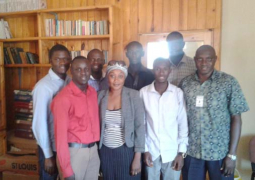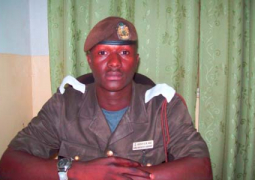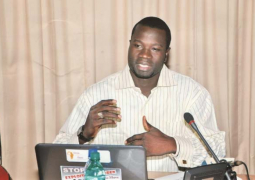The
Inter-Governmental Action Group against Money laundering in West Africa (GIABA)
has concluded a 3-day “Regional Stakeholders Forum on Emerging Global AML/CFT
Issues and Implications for GIABA Member States” in Saly, Senegal. The Forum
held from 16 August to 18 August 2016.
The
forum was attended by the President of the ECOWAS Commission, H.E. Marcel Alain
De Souza; President of ECOWAS Community Court of Justice, Hon. Justice Jerome
Traore; Speaker of ECOWAS Parliament, H.E. Moustapha Cisse Lo; Vice President
of ECOWAS Community Court of Justice, Hon. Justice Jude Micah Wright; Financial
Controller of the ECOWAS Commission. Dr. Mohammed Sani; Ambassadors of ECOWAS
Member States designated to Republic of Senegal; National Coordinators of the
ECOWAS National Units in all member States; GIABA National Correspondents and
Heads of Financial Intelligence Units of GIABA Member State; and Technical and
Financial Partners.
The
specific objectives of the forum were to provide a general overview of emerging
AML/CFT risks in the GIABA region; to develop a shared understanding of the
requirements for the implementation of the FATF Revised Standards to enhance
compliance; to provide a platform for appreciation of the GIABA 2016-2020
Strategic Plan; and resource implications; and to strengthen community
cooperation in the fight against money laundering and terrorist financing.
In
his speech at the opening ceremony, President of the ECOWAS Commission, H.E.
Marcel Alain De Souza, reiterated the commitment of the ECOWAS Community to
peace and security in the region through a holistic approach. The President
said it was important for ECOWAS to improve the multifaceted and strategic
approaches and processes required to ensure the desired results in this
specific areas. He identified key areas of attention to include: adequately
resourcing the Financial Intelligence Units (FIUs) of member States; the
judiciary needs to be more active and timely in the adjudication of relevant
cases before them; Civil Society Organizations (CSOs), the media, Youths and
Women Groups among others should be involved in advocating peace and security
in the region.
In
his opening address, the Director General of GIABA, Mr. Adama Coulibaly
highlighted the importance of comprehensive stakeholder engagement in AML/CFT
issues in West Africa, with specific attention on Terrorist Financing to address
the concerns of growing terrorism in the region. The DG emphasized that the
need for peace in the region cannot be overemphasized, and therefore brought to
light the high-level advocacy missions embarked upon by GIABA leadership to
mobilize authorities at the highest level in member States.
He
noted that such high-level advocacy missions are meant to ensure adequate
compliance to global AML/CFT standards and avoid heavy international sanctions
that may result from non-compliance. He also called for the need to carry every
stakeholder along in the preparation for the 2nd round of Mutual Evaluation
exercises of GIABA member States. He concluded by calling on all stakeholders
to expand support and commitment to GIABA and its work to build a peaceful and
prosperous region.
In
their goodwill messages, the Speaker of the ECOWAS Parliament, H.E. Moustapha
Cisse Lo and the President of ECOWAS Community Court of Justice, Hon. Justice
Jerome Traore both expressed their solidarity to GIABA and promised support for
GIABA in their individual capacities. Particularly, the Speaker highlighted the
specific role of Parliament in legislation at various member States and pledge
commitment to work with GIABA to rid the region of these deleterious crimes.
The Dean of the ECOWAS ambassadors accredited to Senegal also expressed the
commitment of the Diplomatic Corps to activities of GIABA and the fight against
Money Laundering and Terrorist Financing.
At
the end of the 3-day programme, the Forum acknowledged that GIABA and member States
have made significant efforts to ensure compliance with international AML/CFT
standards, particularly the FATF Recommendations, and therefore agreed that
there is the need for ECOWAS member States to do more, including putting in
place effective AML/CFT systems to combat money laundering and terrorist
financing in order to comply with the standards.
In
a declaration at the end of the programme, the Forum recommended that
governments of GIABA member States, international organizations, the private sector,
civil society organizations, the media and the public join in the common effort
to fight money laundering and the financing of terrorism. The participants
further called for the enactment of comprehensive AML/CFT legislations with
appropriate sanctions for contravention in line with the FATF Recommendations;
ensuring that member States have the capacity to assess the risk of money
laundering and terrorist financing on a continuous basis and implement
appropriate measures to prevent or mitigate the risks; ensuring that Member
states have the capacity to coordinate national AML/CFT policies and implement
legislation and building the capacity of personnel within all AML/CFT
stakeholder institutions.
The
participants also recommended the promotion of national and international
cooperation by establishing a sound legal and operational framework to
facilitate mutual legal assistance and information exchange; intensifying
education, advocacy and sensitization aimed at combating ML/TF at the
grassroots through the media, Civil Society Organisations and the ECOWAS
National Units to counteract the radicalization of the youth; strengthening
engagement with development partners to mobilize more funds for GIABA
programmes and establishing incentivisation for confiscated and recovered
assets.
The
Forum also recommended to the ECOWAS Authority that a certain percentage of the
community levy should be given to GIABA in addition to its regular budget to
pursue its programmes given the importance of these programmes to the peace and
security of the region.
In
concluding, the stakeholders declared:
“To achieve the objective of implementing AML/CFT measures of acceptable
international standards in the ECOWAS region, we agree to work together and
intensify efforts to foster our goal through mutual support, cooperation and
collaboration and by effectively advocating for those particular demands that
will enable us to achieve this goal.”
Read Other Articles In Article (Archive)
Woman fined D2,000 for assault
Mar 18, 2015, 10:36 AM




